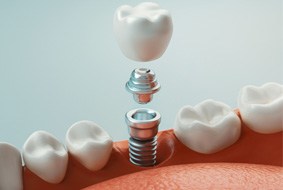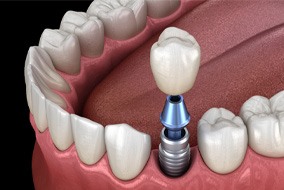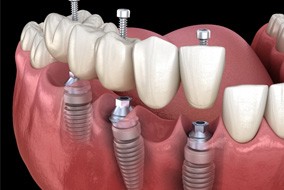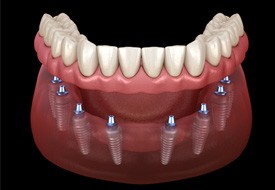Dental Implants – Columbia, TN
Regain Your Attractive, Complete Smile
 In today’s world, there is no better option for replacing missing teeth than dental implants. Dental implants are made from biocompatible titanium, and they are crafted to be prosthetic “tooth roots” that support a high-quality restoration. The final result is healthy, durable, functional, and virtually seamless from the rest of your natural smile.
In today’s world, there is no better option for replacing missing teeth than dental implants. Dental implants are made from biocompatible titanium, and they are crafted to be prosthetic “tooth roots” that support a high-quality restoration. The final result is healthy, durable, functional, and virtually seamless from the rest of your natural smile.
In today’s world, there is no better option for replacing missing teeth than dental implants. Dental implants are made from biocompatible titanium, and they are crafted to be prosthetic “tooth roots” that support a high-quality restoration. The final result is healthy, durable, functional, and virtually seamless from the rest of your natural smile.
Dr. Goodman partners with surgical specialists to help patients turn back the clock on their smile. If you are interested in state-of-the-art dental implants in Columbia, contact us today and schedule a consultation.
Why Choose Goodman Family Dentistry for Dental Implants?
- We Accept Dental Insurance & Offer Financing
- A Dentist with Over 10 Years of Experience
- Comfortable, Clean & Modern Dental Office
What are Dental Implants?

Dental implants are small titanium posts that are surgically secured within the jawbone, below the gumline. They are designed to be able to fuse with the bone, just like the roots of your natural teeth would, allowing them to offer an incredibly strong foundation for any type of restoration to be attached to, depending on the number of teeth you’re missing.
The 4-Step Dental Implant Process

The process of placing dental implants is much more complex than those of traditional dentures and dental bridges. While it typically takes several months to receive these remarkable prosthodontic devices, they provide a wide range of benefits that make them well worth the wait and effort. At Goodman Family Dentistry, we partner with the finest oral surgical specialists in the Columbia area to ensure that our patients receive the best possible care so they can achieve their ideal smiles. While each patient’s treatment plan will be unique, the process always consists of four main steps: a consultation at our office, the placement surgery, the osseointegration stage, and the mounting of the final restoration.
Initial Dental Implant Consultation

Your initial consultation with Dr. Goodman will consist of a thorough evaluation of your oral health and medical history as well as an intensive examination of your teeth and gums. Our team may also capture X-rays to help us plan your procedure. If you’re not ready for implants yet, we’ll be happy to schedule you for restorative or periodontal treatments to restore your oral health or refer you to a specialist for bone grafts. When you’re ready, we can schedule you for dental implant surgery.
Dental Implant Surgery

Once you consent to our proposed treatment plan, the next step will be to schedule and complete your dental implant placement surgery. At Goodman Family Dentistry, we partner with local specialists for this part of the process, ensuring that you receive lasting and reliable results. Dental implant surgery is rendered painless by anesthetics, and you may receive sedation treatment if necessary.
Dental Implant Osseointegration & Abutment

Following your surgery, you’ll undergo a healing process that will last for between three and six months. During this time span, osseointegration will also occur, which is when the implants will naturally fuse with the jawbone—one of the most crucial parts of the process. Once this process is complete, you will undergo minor surgery to have abutment pieces placed on your dental implants, which will allow them to support lifelike dental restorations.
Delivery of Dental Implant Restoration(s)

Finally, the last part of your treatment will involve Dr. Goodman attaching your permanent restorations. Depending on your tooth loss situation, this can mean attaching a bridge, a crown, or a denture to your implants. Since it will be anchored securely in your jawbone, your restoration will be able to exert almost all your natural chewing power, and it may last for life if you take excellent care of it.
Benefits of Dental Implants

More than 500,000 people choose dental implants each year—and it’s easy to see why! With a success rate of over 95%, they’re the most reliable and natural-feeling way to replace missing teeth. At Goodman Family Dentistry Columbia, we partner with trusted specialists who use advanced surgical techniques to restore both the root and crown of your tooth. This provides lasting strength, functionality, and other benefits that other tooth replacement options just can’t match. Read more below to see how dental implants can change your quality of life for the better.
Day-to-Day Benefits

Dental implants make everyday life easier and more enjoyable. Because each implant is securely placed in your jaw, you’ll regain over 70% of your natural bite strength. This means you can eat all your favorite foods without worry.
Other daily perks include:
- A Natural Look and Feel: Your implanted restoration, whether it’s a crown, bridge, or denture, will look completely natural. No one will know it’s not your real teeth!
- Easy Maintenance: Brush and floss just like normal with no special tools required.
- A Confident Smile: No slipping, clicking, or adhesives here, just a fully restored smile you’ll be proud to show off.
Health Benefits

Dental implants do more than restore your smile—they also help protect your health. Because they’re anchored into your jawbone, implants stimulate the bone and help preserve jaw strength and density.
Other long-term health advantages include:
- Conservative Treatment: Traditional dental bridges require modifications to otherwise healthy surrounding teeth. Dental implants are self-contained, so there’s no tooth shaping necessary.
- Better Oral Health: Because dental implants are easier to clean, you’ll lower your risk of gum disease and overall health complications.
- Nutritional Support: Strong support allows you to chew nutritious, fibrous foods more effectively. This supports better digestive health as well.
Long-Term Benefits

Dental implants are a lasting investment in your smile and well-being. Unlike traditional dentures or bridges, which may need frequent replacements, implants are designed to last for decades, with many lasting a lifetime!
Additional long-term benefits include:
- Looking Younger Longer: A stronger jawbone means a fuller, more youthful facial shape that you can enjoy well into your golden years.
- Protecting Your Bite: Since dental implants replace missing teeth, your smile won’t shift over time, keeping its alignment comfortable.
- Saving Money Over Time: Other tooth replacement options require consistent maintenance and adjustments. Dental implants save you time and money by staying strong.
With proper care and regular checkups at Goodman Family Dentistry Columbia, your dental implants can provide you with years of reliable function and confidence.
Who Can Dental Implants Help?

Dental implants can help patients experiencing a variety of different tooth loss situations, making it one of the most versatile treatments for replacing missing teeth that we offer! Based on your thorough evaluation with Dr. Goodman, your dentist in Columbia will outline a treatment plan for you so you can know how exactly we plan to restore your smile. It can include any of the three pathways below.
Missing One Tooth

With a traditional crown replacement, although only one tooth is missing, at least two others are affected. That’s because those adjacent to the vacated space are relied upon to act as anchors (abutments). Thus, they have to be prepared to receive porcelain crowns, which includes the partial removal of their enamel and the reshaping of each tooth. The replacement crown will then be bonded to the abutments with the aid of dental cement.
These alterations can be completely bypassed when Dr. Goodman places an implant dental crown in Columbia. Instead of relying on other teeth for support, the dental implant insertion makes for a completely self-reliant structure. Consisting of a cylinder-shaped titanium post that is inserted into the underlying jawbone, the single tooth dental implant provides a degree of security that is near equivalent to your original tooth root. After you’ve healed adequately from the initial procedure, we’ll add an abutment (also made from titanium), which will allow for the porcelain crown restoration to be securely attached.
Missing Multiple Teeth

Traditional tooth replacement options like fixed bridges and dentures are supported by healthy teeth and oral structures. This can cause more damage to remaining teeth and overall oral health. Instead, a dental implant supported restoration is a fully self-supporting solution. The dental implant posts mimic healthy tooth roots, providing support for the restoration and protecting healthy oral structures. Implant supported restorations deliver the closest to natural results, giving patients back their healthy, functional smiles.
Missing All Teeth

Dental implants can still be a viable tooth replacement option, even in cases of complete tooth loss. A small number of implants are spread strategically throughout the mouth to support a full prosthetic that is stable, comfortable, and lifelike. A hybrid denture can be permanently fixed within your mouth. Alternatively, a removable overdenture attaches to placed implant abutments. Dr. Goodman also offers All-on-4 implant dentures for those who have sustained jawbone loss due to tooth loss.
Understanding the Cost of Dental Implants

After tooth loss occurs, dental implants are without a doubt a worthy investment in your continued oral health -- but they do come at a higher cost than any other option in tooth replacement. Finding out just what your dental implants will cost will help you budget to make them fit right within any financial constraints. Keep reading to learn more about the factors influencing the price of dental implants, and how to find out just what yours will cost.
Factors That Can Influence the Cost of Dental Implants

No two smiles are the same -- and no two oral procedures are the same, either. It is very difficult to estimate the cost of a dental implant procedure without a thorough evaluation, as the price may vary quite a lot from one case to the next. The best way to find out what your dental implant procedure will cost is to book a visit with our office.
During a consultation, Dr. Goodman will consider the following factors to determine the cost of your implant procedure:
- How many teeth are missing: Dental implants are individually priced, which means that the number of teeth you have lost will be perhaps the greatest factor influencing the total cost of your implant procedure.
- Bone health: Dental implants require plenty of healthy jawbone structure for successful attachment. If significant bone loss has occurred due to missing teeth or gum disease, you may need to have a bone graft performed before implant posts can be placed. This additional procedure will increase the cost of dental implants.
- The location of the missing teeth: Given aesthetic concerns and tight spaces, implant procedures are more complex for front teeth. This means it is more expensive to replace front teeth than molars or premolars.
- Other considerations: Most dental implants are made out of titanium, but patients who have a metal allergy may require posts made from zirconia or ceramic. These special materials increase the cost of an implant procedure. Additionally, general anesthesia costs more if it is required for more complex cases.
Making Dental Implants More Affordable

Once you have a cost estimate for your dental implant procedure, you and our team can discuss how to make them fit comfortably within your budget. Unfortunately, dental insurance usually does not cover the cost of dental implants -- but you may be eligible for coverage for certain aspects of the procedure, like discounts on the crown or denture that is secured on top of the implant post. Additionally, financing through CareCredit can allow you to make smaller payments on your bill.
Dental Implant FAQs
Can I take out dental implants?
No, you can't remove a dental implant on your own. It is unique because it replicates both the root and crown. A titanium post mimics the root, which your bone will fuse to through a process called osseointegration. Only a trained dental professional can remove it. Although you can't remove the post, some implant dentures can be taken out for easy cleaning.
How long do dental implants last?
Dental implants are the most reliable method of treating tooth loss. They can last for 30 years or longer with the right care, like brushing and flossing. Various factors affect their lifespan, such as their placement. Molars undergo more wear and tear than the front teeth. They may have a slightly shorter life expectancy. You can protect them from unnecessary pressure by limiting chewy, hard, or sticky foods. If you have a habit of grinding or clenching your teeth, ask your dentist for a nightguard.
Am I too old for dental implants?
There isn't an age limit for dental implants. Instead, your implant dentist in Columbia considers your oral and general health, including any medications you are taking. With age comes certain prescriptions and medical conditions, which can make your case more complex than others. That doesn't mean you aren't a candidate for the procedure. You may need a little prep work, like bone grafting. Although there might be a few more steps in your treatment plan, your dentist can replace your lost teeth safely.
What are the signs of dental implant failure?
Less than 5% of dental implants fail, but it's important to watch for any signs of a complication, like redness, inflammation, or pain near the post. Don't wait to see your dentist. Quick diagnosis and treatment can stop complete implant failure. You can safeguard your investment by brushing, flossing, and using a mouthrinse. Visit your dentist every 6 months for a cleaning and checkup. They will check your dental implants at each appointment to ensure there aren't any concerns, like signs of an infection. It's best to avoid anything that can compromise your smile, like smoking, using your teeth to open bottles, or chewing on your fingernails. Wear an athletic mouthguard if you play sports.
What should I do if my dental implant feels loose?
After your bone has integrated with the post, it should never feel loose. If your implant wiggles or doesn't feel stable, contact our office right away. Sometimes, it can be as simple as a loose restoration; however, it can also indicate something more serious, like an infection or bone loss.
